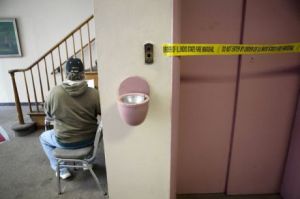  I recently had one of my hotels call me about a guest who was burning incense in his guestroom, while he was staying at the hotel. After the guest checked out, he was charged the Hotel’s “no smoking fee†of $250, as the Hotel was a non smoking hotel.
 I recently had one of my hotels call me about a guest who was burning incense in his guestroom, while he was staying at the hotel. After the guest checked out, he was charged the Hotel’s “no smoking fee†of $250, as the Hotel was a non smoking hotel.
The guest immediately challenged the no smoking fee, and claimed he was burning the incense for “medical†reasons, it was “aroma therapyâ€. The Hotel asked the guest for a note from his Doctor prescribing the “aroma therapy†and guess what…the guest produced a Doctor’s note. It was a real prescription, from a real Doctor. So, that begs the question….does the American’s with Disabilities Act (ADA) apply? Do you as an Innkeeper have to allow aroma therapy or medical marijuana use in your non smoking hotel?
The answer is: We’re not sure yet…..
I took this question to the Hospitality Law Conference, which is held in Houston every February. The Hospitality Law Conference is attended by 400 hospitality Attorneys. These Attorneys come from all the major hotel brands, major hotel management companies and includes hospitality educators from all of the major hospitality Universities nationally. I searched out the best hospitality legal minds from our industry to discuss this issue with them.
I was surprised to learn there was no general consensus on how to handle medical marijuana /aroma therapy and the ADA, at hotels. There is no known “case law†on this issue yet, and I received a wide variety of legal opinions on how to handle the medical marijuana dilemma. I have summarized below, the “best practices†for handling medical marijuana / aroma therapy at your Hotel, based on discussions I had with the hospitality industry legal experts:
- Place marijuana smokers in “smoking rooms†when available. If you receive a guest complaint of marijuana use in the hotel, you should investigate. If you find the marijuana smoker, ask them for their medical prescription, or State ID card, for legal medical marijuana use. If they have the proper paperwork, allow them to continue in the smoking room (if you allow smoking). If they don’t have proof of the legal use of marijuana, ask them to stop, call the Police, or handle it according to your management guidelines.
- If you are an all “No Smoking†hotel, then guests using medical marijuana should be handled the same as cigarette smokers. They must leave the building to smoke. They are no different than cigarette smokers. If they smoke in their guestroom and you have the proper “no smoking†notifications and signage, then charge them your normal smoking fee. Again, you treat them the same as a cigarette smoker. I would recommend if you have “no smoking†signage in the rooms, that you add the words “this includes medical marijuana†on the signs at your next convenience.
 *****Note****, number 2 above applies to guests who are “mobile†and who can easily walk around, use the stairs and elevators, and have no physical restrictions. Most of the legal experts I spoke to agreed, that if a guest has limited mobility, due to a disability etc, then we should handle this guest differently. If the guest cannot easily exit and enter the hotel to smoke their medical marijuana, and they insist that the marijuana is part of their treatment for their disability, then you should allow them to smoke in their non-smoking room. Under these circumstances, the legal experts felt the disabled guest could fall under the ADA laws, due to their limited mobility etc. You should not charge them a “smoking feeâ€.
These suggestions are based on the opinions of the “best of the best†hospitality legal experts. As you know, the medical marijuana issue is being debated, legalized and defended all over the United States. Call your local Police or Sheriff departments and find out what your local and State laws are regarding medical marijuana. You should manage the guests at your hotels according to your specific laws.
Remember, you also have the right to ask a guest who is smoking marijuana to stop, unless they have a legal prescription, from a real Doctor, to be using the medical marijuana. If the guest does not have the legal paperwork to smoke marijuana, you can make them stop. Call the Police or Sheriff for assistance if necessary. You can use the internet to “google†a Doctor’s name or clinic, if you want to independently verify the validity of a guest’s medical marijuana use.
I’m sure somewhere in the United States in the near future, we will see some “case law†on the use of medical marijuana, the ADA, no smoking businesses and related issues. Until then, I hope these “best practices†help.
(Todd Seiders, CLSD, is director of risk management for Petra Risk Solutions, which provides a full-range of risk management and insurance services for hospitality owners and operators. Their website is: www.petrarisksolutions.com. Todd can be reached at 800-466-8951 or via e-mail at: todds@petrarisksolutions.com.) Â
Feb 2010
 “…According to the brief, Rodriguez fell, while holding his son, when he slipped on algae growing on a walkway at the hotel…”
“…According to the brief, Rodriguez fell, while holding his son, when he slipped on algae growing on a walkway at the hotel…”




